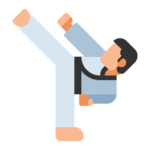
BMI Chart
BMI
Below - 18.5
18.5 - 24.9
25.0 - 29.9
30.0 - and Above
Weight Status
Underweight
Idle Weight
Overweight
Obese
Calculate Your BMI
Keep Going With Your Passion
“Passion is energy. Feel the power that comes from focusing on what excites you.”
Oprah Winfrey
- Basketball
- Volly Ball
- Soccer
- Martial Art
Losing weight too fast may increase your risk of side effects including muscle loss, lower metabolism, nutrient deficiencies, gallstones, and many other risks. This is especially true if you try to lose weight quickly without support from a health professional. Read more
If losing weight is your goal, these 18 foods may help support a healthy weight loss journey, according to science.
Digestive system problems such as heartburn, gas, bloating and constipation reflect what’s happening throughout your body. “As we age, the natural cycles slow down and don’t work as well,” says Johns Hopkins gastroenterologist Gerard Mullin, M.D.
The main drivers of gut health change are shifts in stomach acid, gut immunity, and gastrointestinal flora—the complex ecosystem of bacteria in your digestive system.
When gut health is good, he says, you’re less likely to experience damaging inflammation and lapses in immunity.
The following ways to protect your digestive system may sound surprising because they’re not just about diet. “Everything ties together,” Mullin says. Read More
The first two important concepts to understand: How you lose weight differs from how you gain muscle—these goals often conflict with one another.
In order to lose fat or weight, your body needs to be in a caloric deficit, meaning you are taking in fewer calories per day making it more difficult for your body to maintain its current weight.
What is difficult here is that in order to then gain muscle, your body needs to be at a caloric surplus. This surplus provides the energy your body requires to repair itself and then build muscle mass.
“Some people may think it’s impossible just based on pure science alone,” Silvestri said. “Because if you find yourself in a situation where you are constantly at a caloric deficit, your body then may start to break down other parts of itself for energy requirements. This can, unfortunately, put you in a situation where your body starts breaking down muscle instead of fat for energy.”
Ugh, say it isn’t so! How can you gain muscle while still losing weight when science is working against you? Read More
Although being lean can often be healthy, being underweight can be a concern if it’s the result of poor nutrition or if you are pregnant or have other health concerns. So, if you’re underweight, see your doctor or dietitian for an evaluation. Together, you can plan how to meet your goal weight.
Here are some healthy ways to gain weight when you’re underweight: Read More
Whether you prioritize your heart health, weight loss, or simply a more balanced eating plan, determining the best diet can be a crucial piece of the puzzle in meeting your health and wellness goals. Food is fuel, and it’s important to provide your body with the necessary nutrients. But with the wide variety of diets out there, which ones are the best of the bunch? Read here to know
MEET OUR TEAM

Motwakeil Younis

Zain Mohamed

Sameh Mohamed

Ayman Harb

Mohamed Zain

Yasir Salah Eldein
Choos Your Pack Now
Elite Membership
500 SAR
/Month
- One Sport Opion
- 3 Days Aweek
- Tax Included
- Free Gift
- Free Uniform
- Two Sports Options
Silver Membership
500 SAR
/Year
- Two Sports Options
- Free Gift
- 4 Days Aweek
- Free Uniform
- Tax Included
- Full Lifetime Access
Premium Membership
500 SAR
/Month
- All Sports
- 6 Days Aweek
- Free Uniform
- Free Gift
- Diet Plan
- Tax Included










